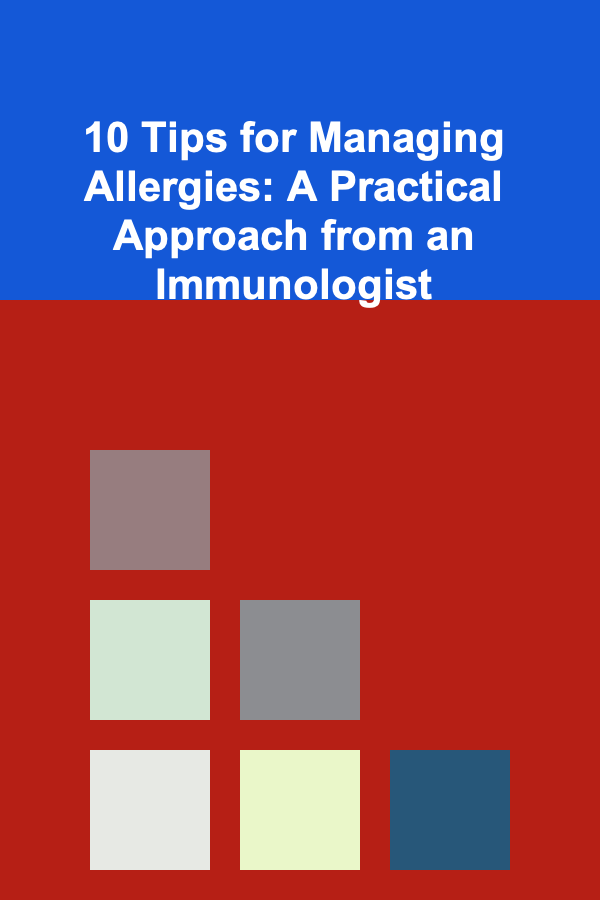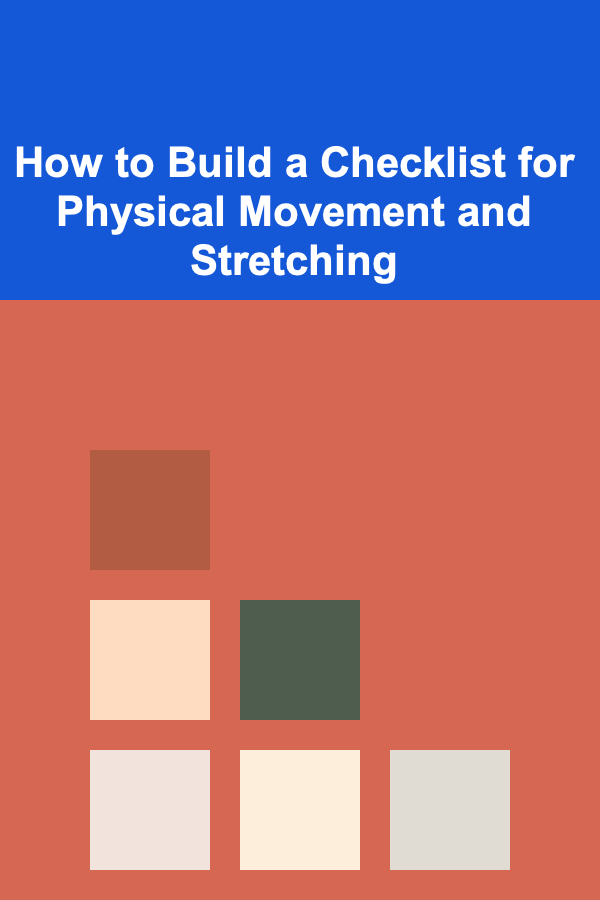
10 Tips for Managing Allergies: A Practical Approach from an Immunologist
ebook include PDF & Audio bundle (Micro Guide)
$12.99$8.99
Limited Time Offer! Order within the next:

Allergies are a common yet often misunderstood health issue that can significantly impact daily life. Whether you're allergic to pollen, pet dander, certain foods, or insect stings, managing allergies requires a proactive, strategic approach. As an immunologist, I've seen firsthand how allergies affect individuals of all ages, and I've gathered practical tips that can help you better understand and manage your allergies effectively. In this guide, we'll cover essential strategies for managing allergic reactions, identifying triggers, and living comfortably while minimizing allergy-related discomfort.
Understand Your Allergies
The first and most important step in managing allergies is understanding what you're allergic to. Allergies occur when your immune system mistakenly identifies a harmless substance (like pollen or dust) as a threat and overreacts. This overreaction can trigger a range of symptoms, including sneezing, itching, rashes, and even severe reactions like anaphylaxis.
How to identify your allergies:
- Keep a symptom diary: Track when your symptoms occur, what you're exposed to, and how severe the reactions are. This can help pinpoint specific allergens.
- Consult an allergist: An allergist can perform tests such as skin prick tests or blood tests to identify your allergens. These tests can help you understand which substances trigger your immune response.
Tip:
Understanding the specific triggers of your allergies allows you to take targeted action. For example, if you're allergic to pet dander, you can take steps to minimize exposure to pets.
Minimize Exposure to Allergens
Once you know what you're allergic to, the next step is minimizing your exposure to these allergens. The more you're exposed, the more severe your symptoms are likely to be. Here are some general strategies to reduce exposure:
- Pollen allergies: On high pollen days, stay indoors, keep windows closed, and use air conditioning to filter the air. If you must go outside, wear sunglasses to protect your eyes and change clothes once you come indoors.
- Dust allergies: Use dust mite-proof covers on pillows and mattresses. Regularly clean your home with a vacuum equipped with a HEPA filter, and wash your bedding in hot water to kill dust mites.
- Food allergies: Always read food labels carefully and inquire about ingredients when dining out. Carry an epinephrine auto-injector (EpiPen) if you have a history of severe reactions to foods.
Tip:
Reducing your exposure is a long-term solution to managing allergies. The more you reduce contact with your allergens, the less likely you are to experience severe symptoms.
Create an Allergy-Free Zone at Home
Home is where you should feel most comfortable, but allergens can easily make their way indoors. Creating an allergy-free zone in your home, particularly in your bedroom, can provide relief from symptoms.
How to create an allergy-friendly home:
- Use air purifiers: HEPA filters can significantly reduce airborne allergens like pollen, pet dander, and dust mites. Place air purifiers in high-traffic areas or rooms where you spend the most time.
- Keep pets out of the bedroom: Pet dander can be a major allergen, so it's a good idea to keep your pets out of your bedroom and off your furniture to limit exposure.
- Remove carpet: Carpets trap allergens, and removing them or replacing them with hardwood floors or tiles can make cleaning easier and reduce the number of allergens in your home.
Tip:
If you can't afford an air purifier, simple methods like keeping windows closed and using fans to circulate air can help reduce allergens to some extent.
Manage Your Environment Outdoors
The great outdoors can be a beautiful and refreshing place to be, but it can also be a breeding ground for allergens. Here's how to manage outdoor allergens:
- Know the pollen forecast: Many weather apps provide daily pollen counts. Use this information to plan your outdoor activities and stay inside during high pollen days.
- Shower after outdoor activities: Pollen and dust can cling to your skin and hair. Showering after spending time outdoors removes allergens and helps you feel more comfortable.
- Choose the right times to go outside: Pollen counts tend to be highest in the early morning and on windy days. Plan your outdoor activities for the late afternoon or evening when pollen levels are lower.
Tip:
If you're particularly sensitive to pollen, wearing a mask while outdoors can help reduce exposure, especially on days with high pollen counts.
Medications: Know When and How to Use Them
There are many over-the-counter and prescription medications that can help manage allergy symptoms. These medications can provide significant relief, but they must be used correctly for maximum effectiveness.
Common allergy medications include:
- Antihistamines: These help block the effects of histamine, a chemical released during allergic reactions. Antihistamines can reduce symptoms like sneezing, itching, and runny nose.
- Nasal sprays: Steroid nasal sprays can reduce inflammation in the nasal passages and are especially helpful for people with nasal allergies like hay fever.
- Decongestants: These can help relieve nasal congestion but should only be used for a short period to avoid rebound congestion.
- Allergy shots (immunotherapy): For individuals with severe or persistent allergies, immunotherapy can be a long-term solution. It involves getting regular injections of small amounts of allergens to desensitize your immune system.
Tip:
Always consult your healthcare provider before starting new medications, especially if you have underlying health conditions or take other medications.
Stay Hydrated
One of the simplest yet often overlooked tips for managing allergies is staying hydrated. When you're dehydrated, your body may produce thicker mucus, which can worsen congestion and other allergy symptoms.
Why hydration matters:
- Thins mucus: Proper hydration helps keep mucus thin and easier to expel, making it easier to breathe.
- Supports immune function: Staying hydrated supports your immune system, which can be beneficial if you're trying to manage allergy flare-ups.
Tip:
Aim to drink at least 8 glasses of water a day, and consider adding herbal teas like peppermint or ginger, which can soothe inflammation in the respiratory system.
Maintain a Healthy Diet
A healthy diet plays a crucial role in managing allergies. Nutrients such as antioxidants, vitamins, and omega-3 fatty acids can help reduce inflammation and strengthen the immune system, potentially reducing allergy symptoms.
Foods to include:
- Omega-3 fatty acids: Found in fatty fish like salmon, walnuts, and flaxseeds, omega-3s have anti-inflammatory properties that can help manage allergic reactions.
- Vitamin C: A natural antihistamine, vitamin C can help reduce the release of histamine and alleviate allergy symptoms. Citrus fruits, strawberries, and bell peppers are rich sources of vitamin C.
- Probiotics: Eating probiotic-rich foods like yogurt, kefir, and sauerkraut may help improve gut health, which plays a role in immune system regulation.
Tip:
Consult with a nutritionist if you're unsure about your diet. They can help you design a balanced eating plan that supports your immune system.
Exercise to Strengthen Your Immune System
Regular exercise is not only good for your overall health, but it can also help strengthen your immune system, making you less susceptible to severe allergic reactions. While some people may experience worse symptoms after exercising outdoors, there are ways to exercise while managing allergies:
Tips for exercising with allergies:
- Exercise indoors: If pollen or air quality is poor, consider exercising indoors at a gym or home. Yoga, Pilates, or strength training can be great options.
- Choose the right time: If you prefer outdoor exercise, try to schedule it in the late afternoon or evening when pollen levels are lower.
- Wear protective gear: If you must exercise outdoors during pollen season, consider wearing a mask or sunglasses to reduce exposure.
Tip:
Regular physical activity can improve lung function and help your body cope with allergy symptoms.
Monitor Air Quality and Pollution
Poor air quality can exacerbate allergy symptoms, especially for individuals with respiratory issues. Pollution, smog, and even high humidity can make breathing more difficult and worsen allergies.
How to monitor air quality:
- Check air quality reports: Many weather websites and apps provide information on air quality and pollen levels. Use this data to adjust your plans.
- Use an air purifier: Invest in a good-quality air purifier with a HEPA filter to remove airborne allergens and pollutants.
- Ventilate your home properly: On days when air quality is poor, keep windows and doors closed. Use exhaust fans in bathrooms and kitchens to help circulate air without letting allergens in.
Tip:
During high-pollution days or when pollen levels are elevated, limit outdoor activities as much as possible, and keep windows shut to minimize exposure.
Be Prepared for Emergencies
For those with severe allergies, especially food or insect allergies, it's essential to be prepared for an emergency. Anaphylaxis, a life-threatening allergic reaction, can occur quickly and requires immediate attention.
How to prepare:
- Carry an epinephrine auto-injector: If you have a severe allergy (e.g., to food or insect stings), always carry an epinephrine auto-injector (such as an EpiPen) with you. Make sure you know how to use it and that it's not expired.
- Inform others: Make sure friends, family, and colleagues know about your allergies and how they can assist in an emergency.
- Wear a medical alert bracelet: This can help others quickly identify your allergies in the event of an emergency.
Tip:
Take allergy emergencies seriously, and never hesitate to seek medical help if you experience severe symptoms. Better safe than sorry.
Conclusion
Managing allergies requires a combination of awareness, preparation, and lifestyle adjustments. By understanding your allergens, minimizing exposure, using medications properly, and making smart environmental choices, you can significantly reduce the impact allergies have on your life. Remember that each person's experience with allergies is unique, so it's essential to work with your healthcare provider to find the best strategies for managing your symptoms. With the right approach, you can lead a healthy, comfortable life despite your allergies.
Reading More From Our Other Websites
- [Personal Investment 101] Earn Money from Deep Learning: How to Build an AI-Powered Income Stream
- [Home Budget 101] How to Prioritize Home Improvement Projects on a Budget: A Practical Guide
- [Organization Tip 101] How to Use Magnetic Recipe Holders for Space-Saving
- [Organization Tip 101] How to Create a Mindfulness Reading List
- [Polymer Clay Modeling Tip 101] Best Secrets for Crafting Polymer Clay Animatronics with Moving Parts
- [Personal Care Tips 101] How to Choose Hand Cream for Nourishing Dry Hands in Summer
- [Paragliding Tip 101] Advanced Maneuvers Unlocked: How to Perform Wingovers and Spirals on Video
- [Ziplining Tip 101] Essential Ziplining Safety Tips for Beginners
- [Stamp Making Tip 101] How to Blend Traditional Woodcut Techniques with Modern Stamp Making
- [Home Pet Care 101] How to Identify Early Signs of Common Dog Health Problems Like Arthritis or Dental Issues at Home

How to Build a Checklist for Physical Movement and Stretching
Read More
How to Manage Your Finances While Traveling
Read More
How to Plan for Health-Related Expenses and Save for Them
Read More
How to Understand Flash Loans on the Blockchain
Read More
10 Tips for Keeping Your Feet Healthy in the Winter Months
Read More
10 Tips for Improving Quality Score in Google Ads
Read MoreOther Products

How to Build a Checklist for Physical Movement and Stretching
Read More
How to Manage Your Finances While Traveling
Read More
How to Plan for Health-Related Expenses and Save for Them
Read More
How to Understand Flash Loans on the Blockchain
Read More
10 Tips for Keeping Your Feet Healthy in the Winter Months
Read More